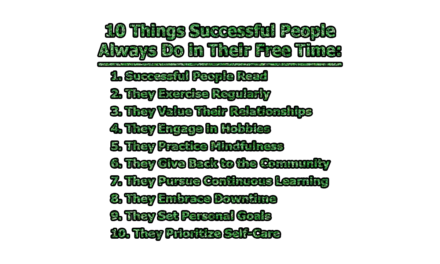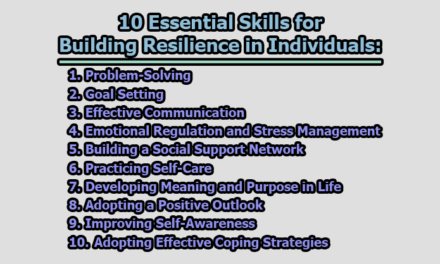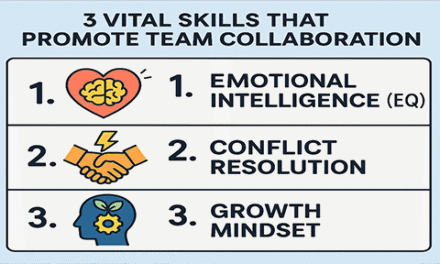10 Proven Ways to Boost Your Confidence in the Workplace:
Confidence is a valuable attribute that plays a pivotal role in one’s success in the workplace. It affects how you handle challenges, interact with colleagues, and make decisions. A confident employee is more likely to take on new responsibilities, engage in productive discussions, and pursue career advancement opportunities. However, building and maintaining confidence is an ongoing process that requires dedication and self-awareness. In this article, we will delve into the 10 proven ways to boost your confidence in the workplace, providing brief insights and practical tips to help you excel in your professional journey.
Way 1: Attend Professional Development Training:
Professional development training offers a plethora of benefits for enhancing confidence in the workplace. These events expose you to the latest industry trends, best practices, and cutting-edge technologies. By staying up-to-date, you become more competent and knowledgeable in your field, which, in turn, bolsters your confidence. Additionally, networking at such events allows you to connect with industry peers, mentors, and experts, providing valuable opportunities for learning and collaboration.
When attending professional development training, actively participate in discussions, ask insightful questions, and engage with speakers and fellow participants. Remember that learning is an ongoing process, and each opportunity to acquire new knowledge contributes to your overall professional growth and confidence.
Way 2: Learn New Skills:
One of the most effective ways to boost confidence is by actively seeking opportunities to learn new skills. Take a proactive approach to your professional growth by enrolling in courses or workshops that align with your career goals. Learning new skills not only enhances your expertise but also expands your comfort zone.
Consider taking on new projects or responsibilities that require the application of these skills. Embrace the challenges that come with acquiring new competencies, as each successful endeavor will reinforce your belief in your abilities. As you gain more skills and knowledge, your confidence will naturally grow, enabling you to tackle more complex tasks with ease.
Way 3: Dress for Success:
Your appearance plays a significant role in how you are perceived by others, as well as how you feel about yourself. Dressing professionally and grooming well can have a positive impact on your confidence levels. When you look your best, you exude an air of professionalism and competence, which can be a powerful psychological boost.
Take the time to dress appropriately for your workplace culture and industry standards. Pay attention to grooming and personal hygiene, as feeling well put together can contribute to a sense of self-assurance. A confident appearance not only influences how others perceive you but also affects how you carry yourself and interact with colleagues and superiors.
Way 4: Leave Your Comfort Zone:
Stepping outside of your comfort zone is essential for personal and professional growth. While it may seem daunting, challenging yourself to take on tasks that push your boundaries can be incredibly rewarding. By embracing new experiences, you build resilience and adaptability, which are essential traits for confidence-building.
Start by setting small, achievable goals that require you to step out of your comfort zone. As you accomplish these goals, gradually increase the level of challenge. Whether it’s presenting in front of a larger audience, taking the lead on a project, or networking with senior professionals, each step outside your comfort zone will boost your confidence and contribute to your professional development.
Way 5: Emulate Confident Peers:
Observing and learning from confident colleagues or superiors can be a powerful source of inspiration and learning. Pay attention to their communication style, body language, and problem-solving approaches. By emulating confident behavior, you can adopt some of their successful strategies and apply them to your own professional interactions.
Seek out opportunities to collaborate with confident peers, as their attitudes and approaches can positively influence your own mindset. Engaging with them can also provide you with valuable feedback and mentorship, further enhancing your confidence in the workplace.
Way 6: Set Goals for Yourself:
Goal-setting is a fundamental aspect of personal and professional growth. By setting clear and achievable goals, you provide yourself with a roadmap for success, which boosts your confidence and motivation. Ensure that your goals are specific, measurable, achievable, relevant, and time-bound (SMART). This way, you can track your progress and celebrate milestones along the way.
Break down larger goals into smaller, manageable tasks. Completing these tasks gives you a sense of accomplishment and reinforces your belief in your capabilities. When you achieve your goals, take the time to acknowledge your achievements and use them as a foundation for setting even higher objectives.
Way 7: Focus on Your Strengths:
It’s common for individuals to focus on their weaknesses, which can lead to self-doubt and diminished confidence. Instead, redirect your attention to your strengths and acknowledge your past achievements. Recognizing what you excel at empowers you to leverage these strengths in your work, leading to greater confidence in your abilities.
Ask for feedback from colleagues and superiors to gain insights into your strengths. By focusing on your positive attributes, you can approach challenges with a more positive and assertive mindset, knowing that you possess the skills and qualities to overcome obstacles.
Way 8: Learn from Your Mistakes:
Mistakes are an inevitable part of any learning process, and viewing them as opportunities for growth is crucial for building confidence. When you make a mistake, take the time to reflect on what went wrong and identify the lessons learned. Use these experiences as a basis for improvement and make necessary adjustments for future endeavors.
Avoid dwelling on past errors or beating yourself up over them. Instead, view mistakes as stepping stones to success. As you learn from them and implement changes, you become better equipped to handle challenges in the future, bolstering your confidence in your problem-solving abilities.
Way 9: Eliminate Negative Language:
Your self-talk can significantly impact your confidence levels. Negative language and self-deprecating remarks can create a cycle of self-doubt and hinder your professional growth. Replace negative thoughts with positive affirmations and constructive self-feedback.
Practice self-compassion and treat yourself as you would treat a friend facing a challenge. Acknowledge your efforts and progress, and remember that everyone faces setbacks from time to time. Over time, this positive self-talk will help build a more resilient and confident mindset.
Way 10: Ask Questions:
Asking questions is a sign of curiosity and a willingness to learn, not a weakness. If you’re unsure about something, seek clarification by asking for help or guidance. Remember that nobody knows everything, and seeking assistance is a normal part of the learning process.
Asking questions also demonstrates your proactive approach to problem-solving, which can be highly valued in the workplace. Moreover, the knowledge you gain from asking questions will equip you with the tools to tackle challenges with greater confidence and expertise.
In conclusion, confidence in the workplace is a powerful attribute that empowers individuals to achieve their full potential and excel in their careers. Each of the ten ways discussed in this article provides practical strategies to boost your confidence and pave the way for personal and professional growth.
By attending professional development training, actively learning new skills, dressing for success, embracing challenges outside your comfort zone, and emulating confident peers, you can cultivate a more confident and assertive presence in the workplace. Setting clear goals, focusing on your strengths, learning from mistakes, eliminating negative language, and asking questions are additional key practices that contribute to building and sustaining your confidence.
Remember that building confidence is an ongoing journey that requires dedication, resilience, and a growth mindset. By incorporating these strategies into your professional life and continuously striving for improvement, you can unlock your full potential, overcome challenges, and reach new heights in your career. Embrace these ten ways to boost your confidence and watch yourself flourish in the workplace and beyond.
Frequently Asked Questions [FAQs]:
How can attending professional development training boost my confidence in the workplace?
Attending professional development training exposes you to the latest knowledge, trends, and best practices in your field. As you gain new insights and skills, you become more competent and knowledgeable, which naturally boosts your confidence. Additionally, networking and interacting with industry peers and experts during these events can provide valuable validation of your abilities and enhance your self-assurance.
Why is stepping out of my comfort zone important for building confidence?
Leaving your comfort zone is essential for personal and professional growth. By taking on new challenges and experiences, you prove to yourself that you are capable of handling unfamiliar situations. Each successful endeavor outside your comfort zone reinforces your belief in your abilities and increases your confidence. Moreover, growth occurs when you embrace new opportunities and push yourself beyond your existing limits.
How can I eliminate negative language from my self-talk?
Becoming aware of your self-talk is the first step. Pay attention to negative thoughts and language, and consciously challenge them with positive affirmations and constructive feedback. Practice self-compassion and treat yourself with kindness, just as you would treat a friend. Over time, this practice can rewire your thought patterns and cultivate a more positive and confident mindset.
How can I leverage my strengths to boost my confidence?
Identifying and acknowledging your strengths is essential. Focus on tasks or projects that align with your strengths, as these will provide opportunities to excel and reinforce your confidence. Seek feedback from colleagues and superiors to gain insights into your areas of expertise. By focusing on your strengths and leveraging them in your work, you’ll feel more capable and confident in your abilities.
How can learning from mistakes enhance my confidence?
Mistakes are valuable learning opportunities. Instead of dwelling on them, reflect on what went wrong and identify the lessons learned. By making necessary adjustments based on these experiences, you become better equipped to handle challenges in the future, leading to increased self-assurance in your problem-solving abilities.
Is asking questions a sign of weakness in the workplace?
No, asking questions is a sign of curiosity and a desire to learn and grow. It shows that you are proactive in seeking solutions and understanding complex issues. In fact, asking questions can be highly valued in the workplace, as it demonstrates a willingness to collaborate and find the best possible solutions.
How can emulating confident peers help improve my confidence?
Confident peers can serve as role models and mentors. Observe their behavior, communication style, and problem-solving approaches, and learn from their successful strategies. Emulating confident behavior can positively influence your own mindset and interactions with others. Engaging with such colleagues can also provide valuable feedback and support in your professional journey.
Can setting goals really impact my confidence?
Setting clear and achievable goals provides a roadmap for success, boosting your confidence and motivation. As you progress towards these goals and celebrate milestones, you gain a sense of accomplishment, reinforcing your belief in your abilities. Goals also provide focus and direction, helping you overcome obstacles and stay committed to your personal and professional growth.
How can dressing for success improve my confidence?
Your appearance plays a significant role in how you perceive yourself and how others perceive you. Dressing professionally and grooming well can boost your self-esteem and create a positive first impression. When you look at the part, you feel more confident in your abilities, which reflects in your interactions and overall demeanor.
Why is continuous learning important for building and maintaining confidence?
Learning new skills and knowledge not only enhances your expertise but also expands your comfort zone. As you acquire new competencies, you become more versatile and adaptable, increasing your confidence in handling diverse challenges. Continuous learning keeps your mind engaged and motivated, fostering a positive and proactive attitude in your professional life.

Library Lecturer at Nurul Amin Degree College










